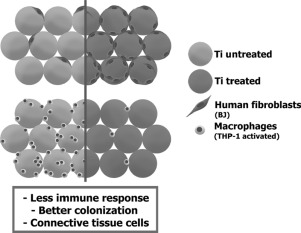Biomaterials Advances ( IF 5.5 ) Pub Date : 2020-03-13 , DOI: 10.1016/j.msec.2020.110845 Julien Barthes 1 , Martina Cazzola 2 , Celine Muller 1 , Camille Dollinger 1 , Christian Debry 3 , Sara Ferraris 2 , Silvia Spriano 2 , Nihal E Vrana 4

|
In order to create a stable interface with the host tissue, porous implants are widely used to ensure the in-growth of the cells and the colonization of the implant. An ideal porous implant should have a 3D architecture that enables fast migration of incoming cells while not inducing a significant pro-inflammatory response by the immune cells. Moreover, in patients where the healing is impeded (patients with co-morbidities and metabolic diseases), porosity by itself is not enough for fast colonization, and the surface properties of the implant should also be controlled. In this study, we present a controlled oxidation-based surface treatment of microbead-based porous titanium implants which not only increases the colonization by connective tissue cells but also decreases the macrophage attachment. The treatment created a nanotextured surface on the implants with an acidic shift of isoelectric point (from 4.09 to 3.09) without endangering implant's mechanical integrity. The attachment and metabolic activity of activated macrophages were significantly lower on treated surfaces with an increase in the secretion of anti-inflammatory IL-1RA and a decrease in pro-fibrotic CCL-18. Human fibroblasts proliferated faster on the treated surfaces over 14 days with near complete colonization of the whole thickness of the implant with an accompanying an increase in the secretion of TGF-beta. The surface treated samples demonstrated partial filling of the entire pores. We demonstrated that the use of nanoscale surface treatments that can be applied to the whole internal surface of porous titanium implants can significantly alter both the immune response and the colonization of the implants and can be used to fine-tune and personalize implant interfaces according to patient needs.
中文翻译:

通过创新的表面化学处理控制多孔钛/软组织的相互作用:巨噬细胞和成纤维细胞的反应。
为了建立与宿主组织的稳定界面,多孔植入物被广泛用于确保细胞向内生长和植入物的定植。理想的多孔植入物应具有3D架构,该架构能够使传入细胞快速迁移,同时又不会引起免疫细胞明显的促炎反应。此外,在愈合受阻的患者(合并症和代谢性疾病患者)中,仅靠孔隙率不足以快速定植,还应控制植入物的表面特性。在这项研究中,我们介绍了基于微珠的多孔钛植入物的基于控制氧化的表面处理,这不仅增加了结缔组织细胞的定殖,而且减少了巨噬细胞的附着。该处理在植入物上形成了纳米结构化表面,其等电点呈酸性变化(从4.09到3.09),而不会危及植入物的机械完整性。活化的巨噬细胞的附着和代谢活性在处理过的表面上显着降低,同时抗炎性IL-1RA的分泌增加,而促纤维化CCL-18减少。人类成纤维细胞在经过14天的处理后表面增殖更快,植入物整个厚度几乎完全定殖,并伴随着TGF-β分泌的增加。经表面处理的样品显示出整个孔的部分填充。










































 京公网安备 11010802027423号
京公网安备 11010802027423号